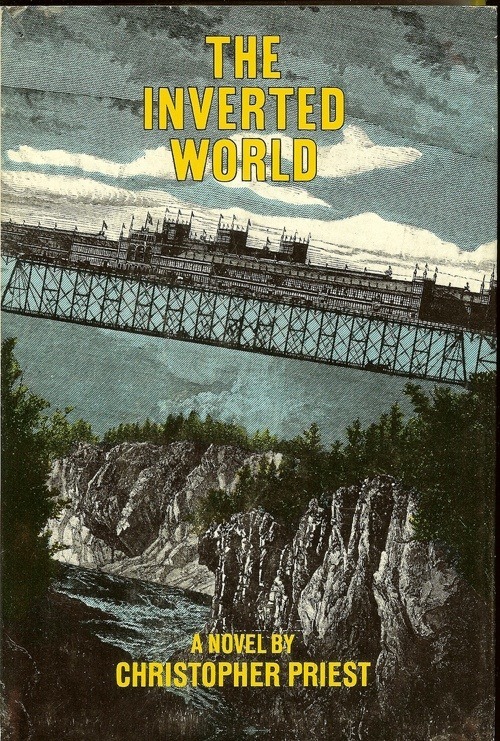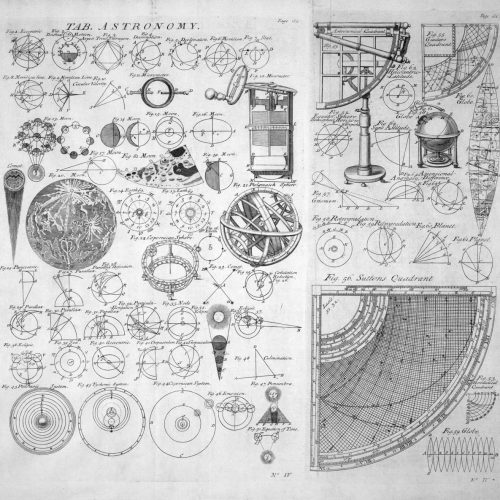Table of Astronomy, Cyclopedia (original)
The Inverted World (Christopher Priest, 1974)

The progenitors of science fiction had more right to call it “speculative” than the technobabblers of today who flinch at the apparently derogatory term sci-fi. Novels like Frankenstein, The Invisible Man, and 20,000 Leagues Under The Sea showed how man and the world would naturally react given the novel stimulus of an impossibility turned possible. Change one thing and watch events play out naturally with normal people, with the narrative usually some distance past the actual change. Now it seems that authors change everything but the stories; switch up everything in the universe and watch the old familiar thriller play out as it has for hundreds of years. Having learned nothing about The Inverted World before reading it, I wasn’t sure which to expect. As it turns out, it’s among the best examples of the old sci-fi I’ve ever read.
It won’t do to discuss the plot, though it’s not much of a spoiler to say that the main character is a denizen of “the city,” a large complex that must be slowly moved along rails northward, to escape a mysterious danger seemingly approaching from the south.
The world building is by the numbers at first, and the writing is unremarkable (and occasionally imprecise), but competent, and dialogue is good. Slowly, the secrets of The Inverted World are revealed to both the protagonist and the reader, and the process is so incredibly compelling that I read some 200 pages in a day, then finished it off just a few minutes ago.
To describe the book further would be to spoil the fun, though there’s no twist exactly, as one finds in movies these days, but rather a logical exposition of the nature of things, and it is both fun to read and interesting to unravel. Most importantly, the problems of this book, and of the world described, are problems that can only occur within the compass of this book and world. There is very little contemporary allusion, or borrowing, or padding with long descriptions of fights and events which, while exciting, are not strictly speaking consequential to the story. This flaw hobbled The Gone-Away World, which has a cloak of grandness but loses itself in minutiae (and for the record, seems to have taken several ideas from Priest’s book).
I’ve only read a few books this quickly in my life, which is certainly a compliment, yet at the same time I never felt it was fluff (as much modern sci-fi is) or overly taxing (as Last and First Men, and Book of the New Sun are). I’ll be recommending this to all of my friends who like an occasional break from contemporary and traditionally-set literature.
Surveillant Society
What happens, exactly, when every individual is not only a node connected to a worldwide network, but is also able to take anything they see and cause it to be made public and (efforts are made in this direction) unable to be taken down? The consequences are complex and far-reaching, and we would do well to start thinking about them now.
Directed and shot by my good friend Mike.
The Holy Mountain
‘Tis one thing to copy, and another thing to imitate from nature. The copier is that servile imitator, to whom Horace gives no better name than that of animal; he will not so much as allow him to be a man. Raphael imitated nature; they who copy one of Raphael’s pieces, imitate but him, for his work is their original. They translate him, as I do Virgil; and fall as short of him, as I of Virgil. There is a kind of invention in the imitation of Raphael: for though the thing was in nature, yet the idea of it was his own. Ulysses travel’d, so did Aeneas; but neither of them were the first travelers: for Cain went into the land of Nod, before they were born: and neither of the poets ever heard of such a man. If Ulysses had been kill’d at Troy, yet Aeneas must have gone to sea, or he could never have arrived in Italy. But the designs of the two poets were as different as the courses of their heroes, one went home, and the other sought a home. To return to my first similitude. Suppose Apelles and Raphael had each of them painted a burning Troy; might not the modern painter have succeeded as well as the ancient, though neither of them had seen the town on fire? for the draughts of both were taken from the ideas which they had of nature. Cities had been burnt before either of them were in being.
Sister Crayon – “(In) Reverse”
Bellow
With shades of Nudge, but with more of a focus on the vocalist’s soft but soaring voice, Sister Crayon’s Bellow is a thoroughly pleasant album which, while it rarely ventures too far in any direction, succeeds very well at what it does. There are a few times when they transcend their own type – the brief ending revel of “Stem,” or the mechanical repetition of “Anti-Psalm,” but for the most part it’s just a beautiful place to inhabit for an hour or so. (insound)
The Internet Archive To Archive Itself On Paper
The Internet Archive To Archive Itself On Paper
“Internet Archive is building a physical archive for the long term preservation of one copy of every book, record, and movie we are able to attract or acquire. Because we expect day-to-day access to these materials to occur through digital means, the our physical archive is designed for long-term preservation of materials with only occasional, collection-scale retrieval. Because of this, we can create optimized environments for physical preservation and organizational structures that facilitate appropriate access. A seed bank might be conceptually closest to what we have in mind: storing important objects in safe ways to be used for redundancy, authority, and in case of catastrophe.”
Vocabulary: Apophthegmatic Raillery Edition
apothegm: a cryptic or pithy, yet instructive, remark or phrase
venditate: to announce or cry out, or to exhibit or blazon
cicisbeo: the escort or lover of a married woman
cark: to care or worry, or a care or worry
disembogue: to discharge or flow forth
badinage: playful banter or raillery
tontine: a type of shared annuit
emmet: archaic term for an ant
tetric: harsh, sour, or rough
halser: rope



